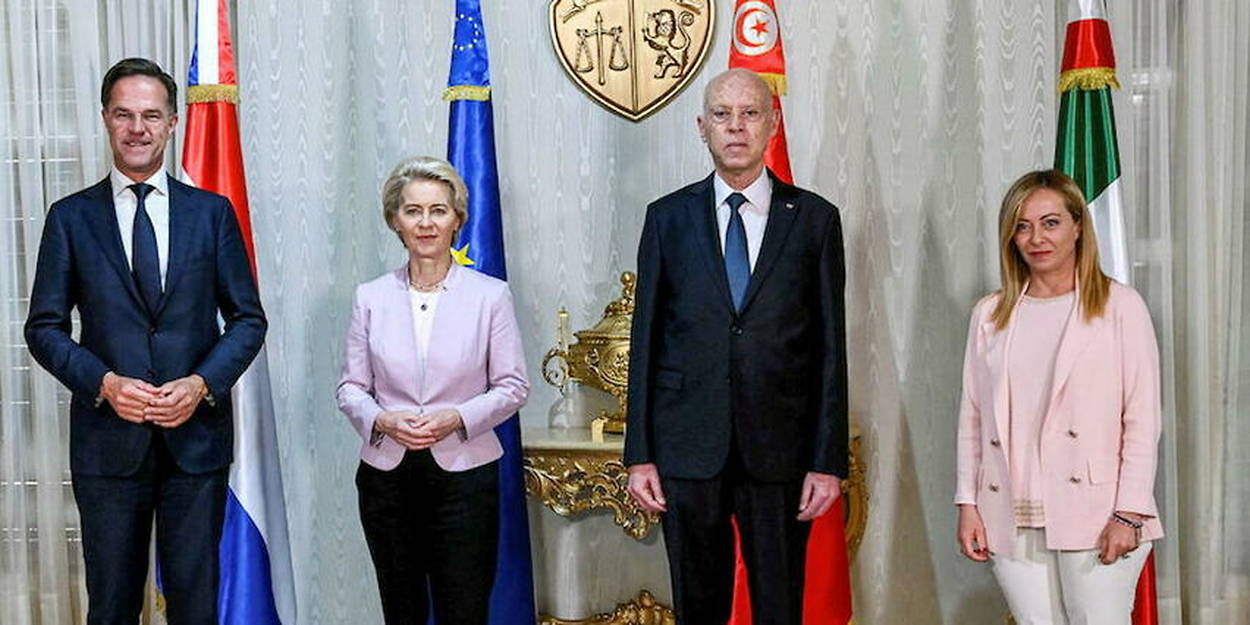I’European Union (EU) may have offered Tunisia a “reinforced partnership” on Sunday with promises of financial aid, but it is not certain that this will be enough to lift the mistrust of international financial rating agencies. Recently, it was the American company Fitch which lowered the Tunisian debt rating by one notch, from CC+ to CCC-. Tunisia was already on the list of countries presenting a real risk of not being able to reimburse, according to the American agency. This new deterioration is only the sign of growing mistrust, because of the delays in the negotiations to obtain a new loan from the International Monetary Fund (IMF).
READ ALSOTunisia: “love story” with Meloni
Three European leaders in Tunis
“It is in our common interest to strengthen our relationship and invest in stability and prosperity [de la Tunisie]that is why we are here”, declared the President of the European Commission Ursula von der Leyen, who came to Tunis in the company of the Prime Ministers of Italy, Giorgia Meloni, and of the Netherlands, Mark Rutte.
After an interview with President Kaïs Saïed, the official announced Brussels’ intention to provide the country with “macro-financial assistance which could reach 900 million euros”. On its website, the Commission specified that it would be a new European loan which “would follow” the granting by the IMF of a credit currently being negotiated for two billion dollars.
Brussels “could provide additional aid of 150 million euros to be injected now into the Tunisian budget”, added Mr.me von der Leyen.
This aid is part of a “five-point package” which the President of the European Commission hopes will be the subject of a bilateral agreement, by the end of June and the next European summit.
Europe, “first trading partner and first investor”, has “supported Tunisia’s path to democracy since 2011 [et la Révolution qui a renversé le dictateur Zine el-Abidine Ben Ali, NDLR]a long and difficult road”, underlined the European leader, without mentioning the current political crisis in the country.
READ ALSOSovereignty poker in Tunis
A “reinforced partnership” conditional, in part, on an agreement with the IMF
President Saïed, who granted himself all the powers in the summer of 2021, is accused of “authoritarian drift” and of having reduced rights and freedoms by the opposition and NGOs.
Since early February, around 20 opponents have been imprisoned on charges of “conspiracy against state security”. According to Amnesty International, they are the subject of “a witch hunt”.
Andrea Cellino, an analyst from the Swiss Middle East Institute MEIS in Geneva, interviewed by AFP, deplored the European attitude: “What about reforms and the restoration of the democratic path? It looks like money for nothing. »
Europe has not hidden its concern for the Maghreb country in recent months, its head of diplomacy Josep Borrell even mentioning a “risk of collapse”.
Indeed, Tunisia is strangled financially by a debt of 80% of its GDP, which leads to recurring shortages of foodstuffs, such as flour and rice, purchased by the State. It has been negotiating for months with the IMF but the discussions have stalled over President Saied’s refusal of reforms including the restructuring of the hundred or so heavily indebted public companies and the lifting of certain state subsidies on basic products.
The program proposed by the EU provides for increased investment in Tunisia, particularly in digital technology and renewable energies, as well as an extension to Tunisia of the European student exchange program Erasmus.
One of the important aspects of the European “package” concerns the fight against the “cynical business” of illegal immigration, for which the EU will provide “this year to Tunisia 100 million euros for the control of its borders, search and rescue” of migrants, said Mr.me von der Leyen.
Mme Meloni, for whom it was the second trip in five days to Tunisia, said she was “satisfied” with the European approach which offers “a real partnership to face the migratory crisis and the question of development” in Tunisia.
The Forum for Economic and Social Rights (FTDES), a Tunisian NGO, denounced in a statement on Sunday the European visit as “a bargain” to “give money” to Tunisia in exchange for reinforced surveillance of its borders. .
READ ALSOTunisia in the eye of the storm
Fitch worries
This European diplomatic ballet did not, in any case, prevent the rating agency Fitch from lowering Tunisia’s rating. This downgrading of the country’s long-term debt rating “reflects the uncertainty surrounding Tunisia’s ability to raise sufficient funds to meet its substantial financial needs,” Fitch said in a statement. Tunisia was already one of the issuers presenting real risks of non-reimbursement, according to the institution. “Our main scenario is for a deal between Tunisia and the IMF by the end of the year, but that’s much later than we previously expected and the risks remain high,” Fitch said.
The agency recalls that the government’s budget depends on more than 5 billion dollars of external funds (10% of GDP) financing which will not be released until there is an agreement with the IMF.
READ ALSOTunisia: Europe in bulk
